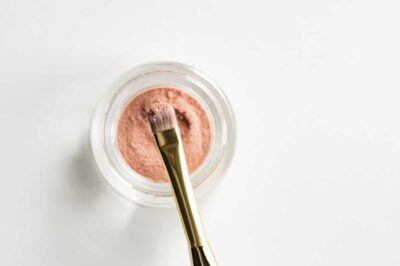Table of Contents[Hide][Show]
Written with Amanda Roberts, one of the authors behind Nutrition Inspector.
Apple cider vinegar seems to be one of the popular kids at the high school of natural health. Can you picture apple cider vinegar and kale leaning up against their lockers, just gossiping away about how they’re the most talked about ingredients in school? All the while, blueberries stand off to the side, wishing someone would notice their antioxidants.
So what’s up with this mysterious vinegar? Why is everyone talking about it and why is it so special?
Apple Cider Vinegar Versus Other Vinegars
Vinegar is made through a double fermentation. First, yeast converts sugars to alcohol. The second fermentation happens when bacteria convert the alcohol to acid. Acetic acid is the main component of vinegar.
Most vinegar is distilled. Thus, when the liquid is heated to a high temperature, the healthy enzymes and probiotics are destroyed. This is one way that apple cider vinegar stands out from other vinegars, because it is often available raw, resulting in a more nutrient-rich product. That murky looking stuff you see on the bottom of bottles labeled “organic raw,” “with the mother,” or “unfiltered” is actually a bunch of good bacteria that your stomach will welcome with open arms.
1—Diet, Weight Loss, and Cholesterol
Vinegar in general has been used for a long time to aid weight loss. It seems to reduce food cravings and leave people feeling fuller after a meal. (Evidence from a 2005 study listed below.) Maybe this is one benefit of starting your meal with a salad and vinaigrette (we’re doing something right!).
Diabetes Journal published a study in 2004 that tested vinegar on blood sugar. Subjects consumed apple cider vinegar in water following a meal high in carbohydrates. Those who had vinegar following their meal showed less flux in insulin, which could mean that their blood sugar was less affected by their meal. Because of the connection between blood sugar and weight gain, this provides good evidence for using vinegar to help maintain weight.
Another study looked at pomegranate vinegar in rats. Rats ingesting pomegranate vinegar experienced smaller increases in body weight and fat mass (while on a high-fat diet) than rats that didn’t get any pomegranate vinegar. Interestingly, the lower dose of vinegar caused less weight gain than the higher dose of vinegar. Of course, these were little rat participants, so the recommended human dosage would not be the same.
Yet another study, this one from the Pakistani Journal of Biological Sciences, tested the effect of apple cider vinegar on the lipid profile of rats. What they found was that apple cider vinegar was lowering the rats’ levels of LDL (“bad”) cholesterol and raising the HDL (“good”) cholesterol.
More studies on the effects of apple cider vinegar would certainly help clarify its health properties, but what we see so far shows its potential as a diet aid. Given that pomegranate vinegar may have a similar effect, perhaps it is the acetic acid in vinegar that is responsible for the weight loss boost.
All in all, if you choose to use vinegar to aid your weight loss, choose raw, unfiltered vinegars for the optimum amount of healthy enzymes.
2—Shiny Hair
Yes, believe it. Apple cider vinegar is amazing for your hair! The acidity actually balances the pH of your scalp, helping to undo the effects of harsh shampoos. Another benefit to this treatment is that it detangles your hair while closing the cuticle, which makes your hair more light-reflective, a.k.a., shiny!
You can mix equal parts of apple cider vinegar and water and rinse it through your hair after shampooing. Leave it on for a few minutes to let it work its magic. Even better, if you have a spray bottle, spray the solution right onto your scalp, then massage it in. You don’t need to use conditioner afterwards, but if smelling like fermented apples doesn’t excite you, you can finish off with your normal conditioner. As your hair dries, the scent will be less strong.
3—Skin Benefits
Did you know that your skin’s pH is naturally acidic? That’s why vinegar makes a good toner. Make your magic potion by using 2 parts water and 1 part vinegar. Either dab on your face with a cotton swab or use a spray bottle and spritz your face.
You can adjust the ratio according to your skin preferences; just pay attention to how your skin looks and feels and go from there. Toner is best applied after you cleanse. You can follow with your serum and oil for the ultimate skin care routine.
Not only does this all-purpose liquid act as a toner, but it can also help even the look of your skin. Simply dab on the skin and leave it on overnight, then get ready to ditch your foundation forever. (Hey, being optimistic here.)
4—Whitens Teeth
If you have yellow teeth, gargling with apple cider vinegar is a simple way to achieve a white set of teeth. ACV removes stains and also kills bacteria present in the mouth and gums. To use this treatment, gargle with apple cider vinegar in the morning and brush your teeth. Follow this process daily for a brighter smile.
5—Fights Infection
Apple cider vinegar contains high levels of natural enzymes that help in eliminating candida overgrowth. The overgrowth of candida, a type of yeast that is naturally present in the body, causes yeast infections, fatigue, sugar cravings, depression, and poor memory.
The antiseptic properties of apple cider vinegar fight fungal and bacterial infections. It is useful in treating candidiasis, bladder infections, as well as ear infections.
Apple cider vinegar is also an effective remedy for a sore throat, cold, and cough. To use, mix one teaspoon each of honey, apple cider vinegar, and water. You can also add some grated ginger for additional health benefits.
6—Blood Alkalinity
If you haven’t read up on blood alkalinity, I give you permission to ditch this article and do so! Your body is constantly striving to maintain balanced, slightly alkaline blood. When your blood gets on the acidic side (easy to do with our modern Western diet), its ability to absorb oxygen is compromised, which is said to lead to disease.
Though vinegar itself is acidic, it actually raises the alkalinity of your blood overtime. You can make this beverage part of your daily life by putting a few tablespoons in water and sipping it throughout the day. Play around: sweeten with honey, add cinnamon for flavor, or toss in some lemon for even more zing! It doesn’t taste as frightening as you’d think (or as frightening as it smells).
7—Good for Digestion
Apple cider vinegar stimulates digestive juices in the stomach, which helps your body break down food easily. Taking one teaspoon of ACV mixed with water can help in treating trapped gas, bloating and indigestion.
Individuals who are suffering from constipation may also get relief by adding two tablespoons of ACV to a glass of warm water. Drink it three times daily to promote bowel movements.
8—Good for Your Bones
One of the health benefits of apple cider vinegar is its ability to prevent osteoporosis. The risk of getting this condition can be reduced by strengthening your bones. Apple cider vinegar aids the body in absorbing calcium, a mineral that makes bone healthy. Not getting enough calcium or if the body doesn’t absorb enough of it can result in weak bones.
Drink one tablespoon of apple cider vinegar along with each meal. This simple method will help in ensuring enough calcium absorption to make your bones stronger and prevent osteoporosis.
9—Natural Flea Control
Have you ever had a dog or cat get fleas? At first you might not really notice. They start grooming a little more frequently, but it doesn’t seem too out of the ordinary. Then you notice little bites on you, and start praying to every god and goddess, hoping that you don’t have bed bugs. Right as you’re about to fling your mattress out onto the curb, it dawns on you: My critter companion has fleas!
When the vet prescribes flea medication, he or she will tell you to only apply it to the back of the animal’s neck, hopefully preventing them from eating the toxic medication. Personally, I haven’t entirely succeeded in preventing my pets from eating forbidden things. Luckily, apple cider vinegar is a chemical-free alternative that can get rid of the infestation.
You can use the same ratio as you would for your own hair: 1 part water to 1 part vinegar. Spray generously on your pooch, or feline/rodent/other pet. Rub in thoroughly. Reapply daily until you notice improvement.
The Risks of Apple Cider Vinegar
As with anything, you don’t want to overdo it. People with low potassium levels and/or low bone density would benefit from talking to a doctor before incorporating apple cider vinegar into their diet.
Because it is highly acidic, always dilute (it will often come pre-diluted). Too much acidity can be harmful to tooth enamel and the throat.
If this article has inspired you to invite apple cider vinegar into the party in your pantry, here is a recipe to get you started:
Apple Cider Vinegar Salad Dressing Recipe
Snagged this one from Detoxinista, a blog dedicated to sharing quick and easy recipes and making healthy living more accessible.
Ingredients:
1 garlic clove, minced
1 tablespoon Dijon mustard
¼ cup raw apple cider vinegar
2 tablespoons fresh lemon juice
1-2 tablespoons raw honey, to taste
⅓ cup extra-virgin olive oil
salt and pepper, to taste
Instructions:
Blend all ingredients together (either put in your blender or in a jar and shake!). Let the ingredients mingle for about 30 minutes before adding to your salad.
References:
“Apple Cider Vinegar Attenuates Lipid Profile in Normal and Diabetic Rats.” Apple Cider Vinegar Attenuates Lipid Profile in Normal and Diabetic Rats, www.scialert.net/abstract/?doi=pjbs.2008.2634.2638. Accessed 16 Aug. 2017.
“Apple Cider Vinegar and Your Health.” WebMD, WebMD, www.webmd.com/diet/apple-cider-vinegar?page=2. Accessed 16 Aug. 2017.
Authority.com, Organic. “How to Use Apple Cider Vinegar For Beautiful Hair and Skin.” The Huffington Post, TheHuffingtonPost.com, 29 Sept. 2012, www.huffingtonpost.com/organic-authoritycom/apple-cider-vinegar-beauty_b_1924171.html. Accessed 16 Aug. 2017.
Bruso, Jessica. “Difference Between Cider Vinegar & Distilled Vinegar.” LIVESTRONG.COM, Leaf Group, 18 May 2015, www.livestrong.com/article/212202-difference-between-cider-vinegar-distilled-vinegar/. Accessed 16 Aug. 2017.
Johnston, Carol S., et al. “Vinegar Improves Insulin Sensitivity to a High-Carbohydrate Meal in Subjects With Insulin Resistance or Type 2 Diabetes.” Diabetes Care, American Diabetes Association, 1 Jan. 2004, care.diabetesjournals.org/content/27/1/281.full. Accessed 16 Aug. 2017.
Mitchell, Lisa. “15 Reasons to Use Apple Cider Vinegar Every Day.” Mindbodygreen, 21 Aug. 2012, www.mindbodygreen.com/0-5875/15-Reasons-to-Use-Apple-Cider-Vinegar-Every-Day.html. Accessed 16 Aug. 2017.
Ok, Elly, et al. “Pomegranate vinegar attenuates adiposity in obese rats through coordinated control of AMPK signaling in the liver and adipose tissue.” Lipids in Health and Disease, BioMed Central, 2 Nov. 2013, www.lipidworld.com/content/12/1/163. Accessed 16 Aug. 2017.
Ostman, E, et al. “Vinegar supplementation lowers glucose and insulin responses and increases satiety after a bread meal in healthy subjects.” European journal of clinical nutrition., U.S. National Library of Medicine, Sept. 2005, www.ncbi.nlm.nih.gov/pubmed/16015276. Accessed 16 Aug. 2017.








Great article, 3 uses of apple cider vinegar in 1 article. Thank you very much for the helpful tips. I can’t wait to try it on my hair, and the see the great result.